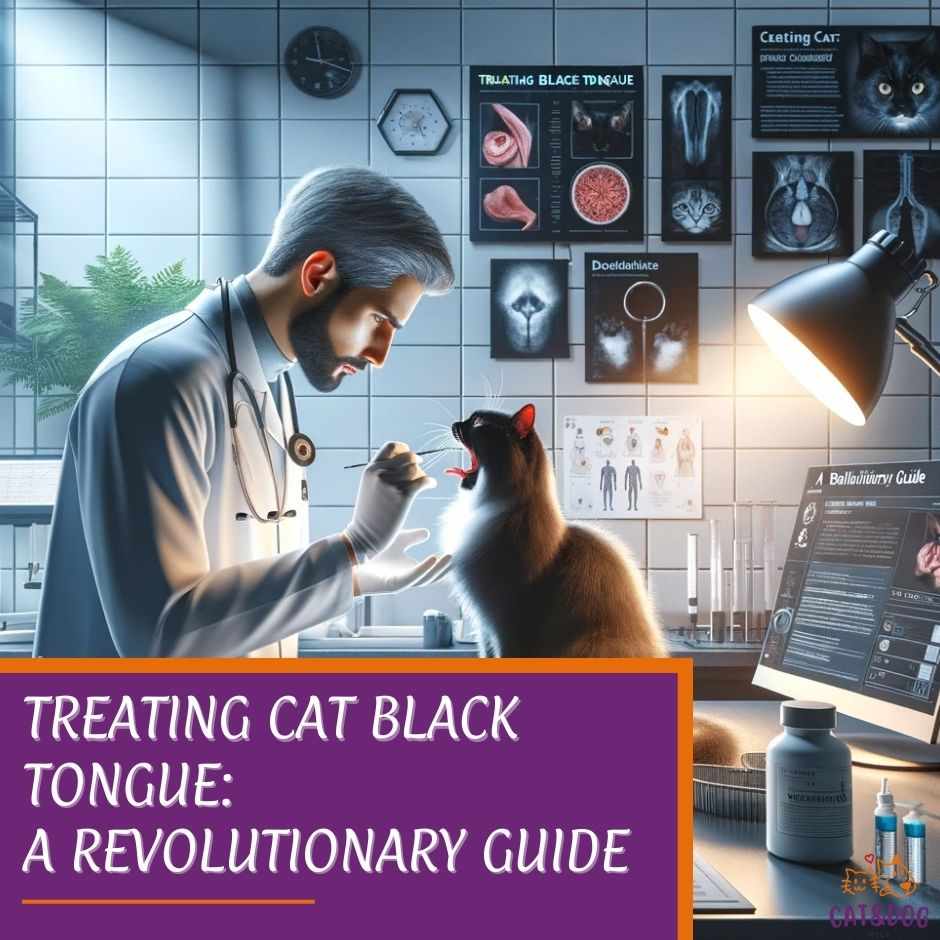Have you ever noticed a cat black tongue? A cat’s black tongue can be quite startling, especially if you’re used to seeing the usual pinkish hue.
Changes in a cat’s tongue color are not just cosmetic; they can be an important indicator of your pet’s health and may require a visit to a veterinary clinic or animal hospital for diagnosis and treatment.
Understanding why your cat might have a black tongue involves considering various factors, from dental hygiene to more serious underlying health issues.
Common reasons include poor oral health, yeast infections, and possible nutritional deficiencies. As a responsible cat owner, recognizing these cues is crucial for ensuring your cat’s wellness.
Equally important is knowing when it’s time to consult your small animal veterinarian, as they can offer a proper diagnosis and advise on the best course of treatment or preventive measures.
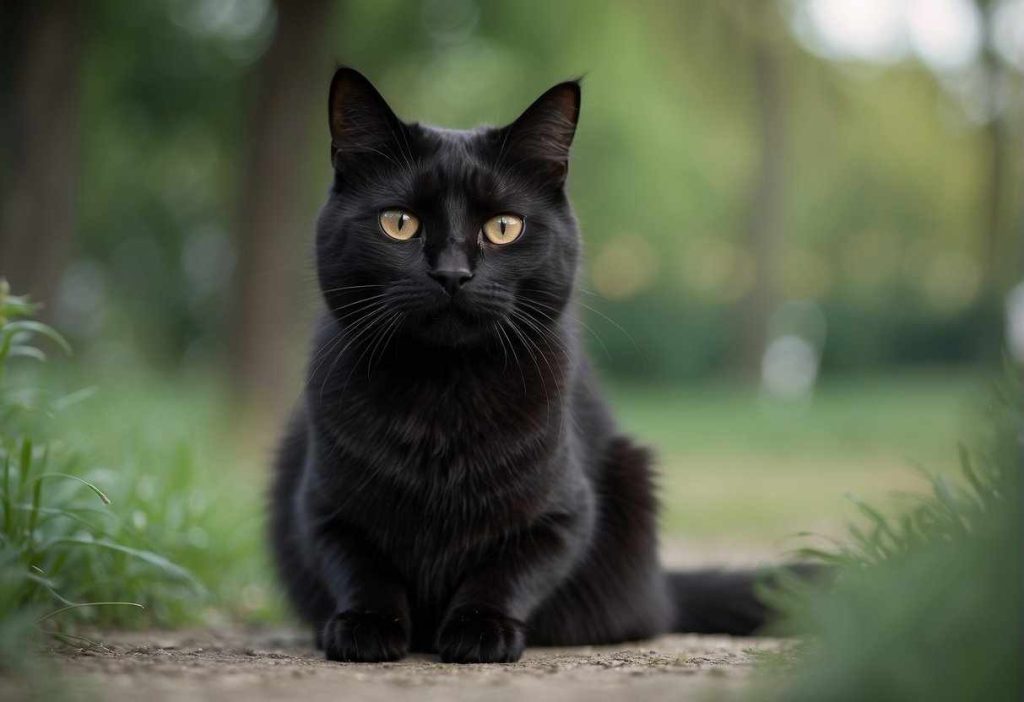
Before you panic, let’s explore what might be behind this mysterious change.
Key Takeaways
- A black tongue in cats could indicate a health issue.
- Oral hygiene could play a key role in tongue discoloration.
- Consult a veterinarian for accurate diagnosis and treatment.
Understanding the Causes of Cat Black Tongue
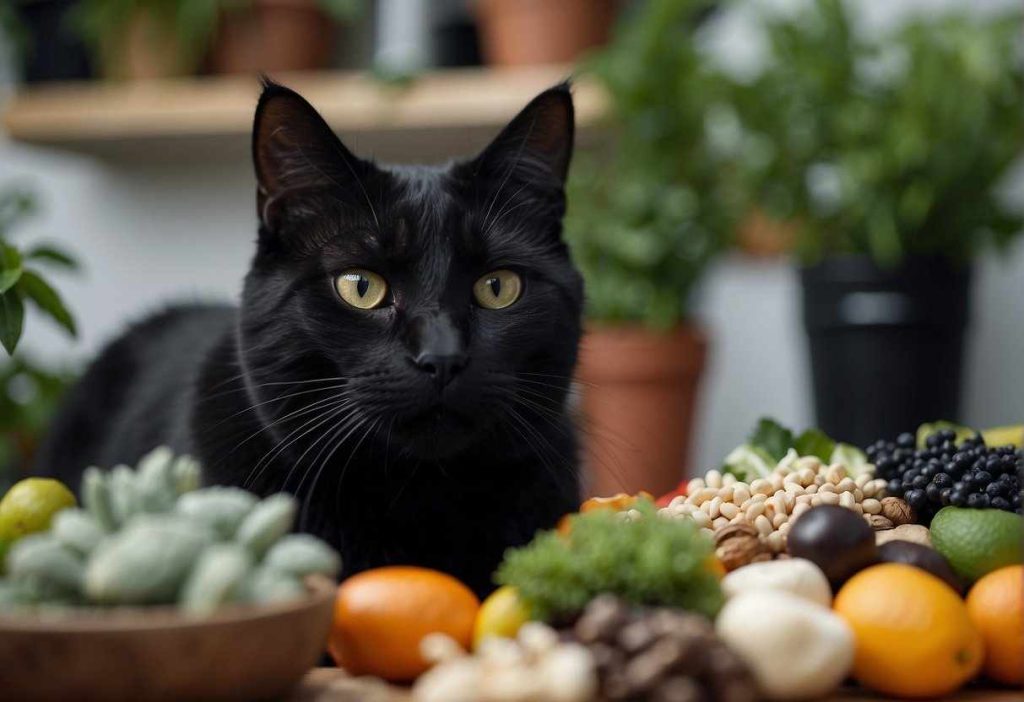
Health Factors:
- Oral Hygiene: Just like you, your cat’s dental health is crucial. Poor dental hygiene could lead to blackening of the tongue. (1)
- Fungal and Yeast Infections: These are common culprits. Have you noticed any funky breath lately? (2)
- Nutritional Deficiencies: Low iron levels can lead to discoloration.
- Diseases: Liver problems or conditions like anemia can turn the tongue black.
Environmental Factors:
- Contaminated Food: Eating contaminated food could introduce parasites like Toxoplasma gondii, which may cause a funky tongue shade. (3)
- Dirty Water Bowls: Unsavory bacteria love unclean water bowls, which can affect tongue color.
Genetic Factors:
Occasionally, your cat’s genes might play a role, giving them a unique tongue color right from birth.
What Should You Do?
- Keep an eye on oral hygiene.
- Provide fresh, clean water.
- Serve well-balanced meals.
If you spot a black tongue, don’t panic, but do chat with your vet to rule out the sinister stuff. Remember, quick action can make a huge difference for your furry pal.
Note the Signs:
- Odd tongue color? Check.
- Weird breath? Double-check.
- Behaving oddly? Vet time!
Alright, that’s the scoop on your cat’s black tongue. Keep these pointers in mind, and your kitty will thank you with plenty of purrs and cuddles! 🐱
Recognizing Symptoms and When to Seek Vet Help
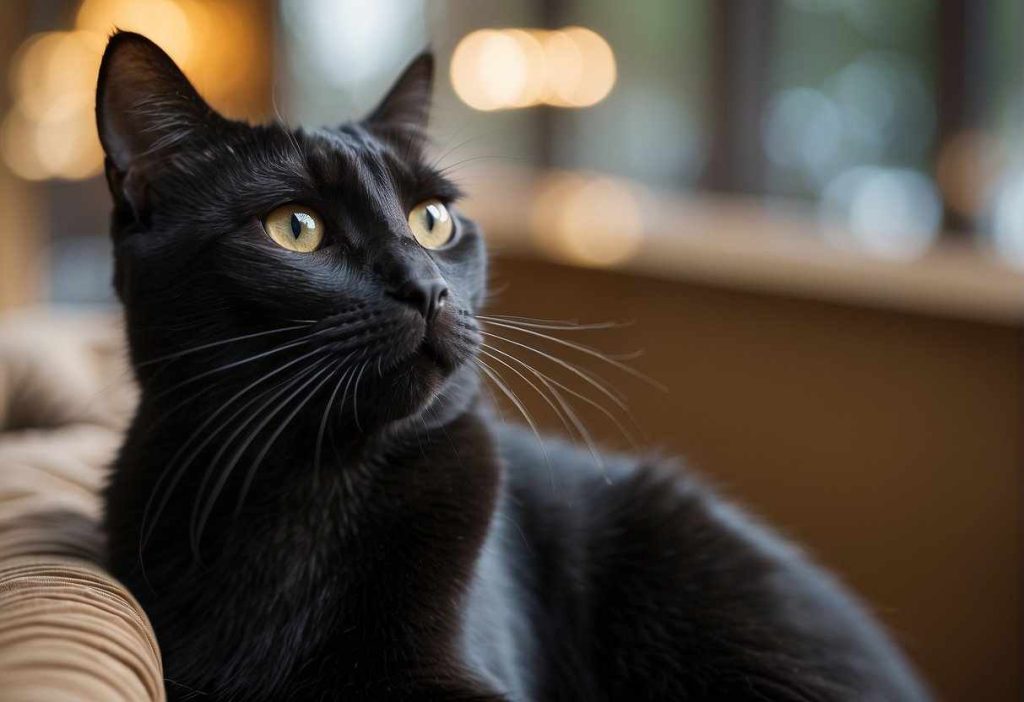
- Unusual darkness on the tongue
- Increased thirst and urination
- Bad breath, quite a stinker! (4)
- Skin lesions or greasy fur
- Swelling or redness in the genital or anal area
If your cat is showing some of these symptoms, it might not just be odd; it could be a sign of something more serious, like a yeast infection or a dietary issue.
When to get your paws moving to the vet:
- If the dark color persists or gets worse
- When other symptoms like bad breath or skin issues accompany the dark tongue
- If your fluffy buddy seems in pain or is acting strangely, like hiding more than usual
Remember, you’re not overreacting by being cautious. Your cat’s health is important. Quick action can make all the difference.
Lastly, let’s not forget oral health! Problems with teeth could also cause discoloration. Have you checked those pearly whites? It’s not just about a winning smile; dental disease could also be the culprit.
Just as changes in tongue color can indicate health issues, observing cat whiskers turning black may also provide important clues about your cat’s overall health and require similar attention
Stay alert, keep an eye on those little signs, and follow your instincts. Your cat counts on you for its nine lives, after all!
Diagnostic and Treatment Approaches
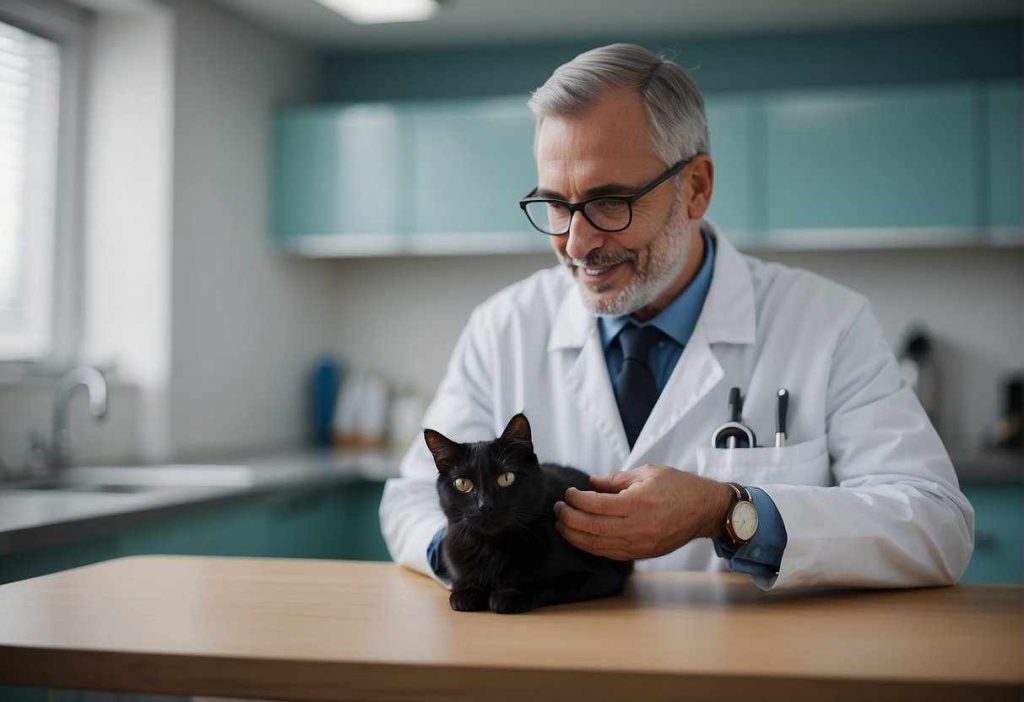
First up: Diagnosis. If you spot a dark tongue, schedule a vet visit. They’ll likely:
- Perform an Oral Examination: Gums, teeth, and the tongue will be checked thoroughly for any signs of disease. (5)
- Ask About Symptoms: Increased thirst, excessive licking, or bad breath? These could hint at underlying issues.
- Conduct Tests: Blood work or a biopsy might be needed to dig deeper.
Now, onto the treatments. Based on what’s causing the discoloration, here’s what your vet might suggest:
- Infections: If it’s a yeast infection causing that funky tongue color, your furry friend might need antibiotics. Yogurt with active cultures can sometimes be a natural aid.
- Gum Disease: Dental hygiene to the rescue! Cleanings or even tooth extractions could be on the cards.
- Tumors: This is rare, but if it’s a squamous cell carcinoma, treatments range from surgery to radiation.
- Dietary Causes: Poor nutrition can lead to tongue discoloration, so a diet makeover could be in order.
Remember, these are general paths your vet might take. Treatment will vary depending on what’s up with your cat’s tongue. Keep those tongues pink and healthy, and when in doubt, give your vet a shout!
Preventive Measures and Long-Term Care
A cat’s tongue turning black can be startling, but with the right knowledge, you can provide preventive care that keeps those purring engines running smoothly.
Routine Check-ups: Just like you, your cat needs regular dental consultations. A veterinarian should examine your feline at least once a year—or even twice if they’re older or have health concerns.
These check-ups are crucial for catching early warning signs of dental diseases, which may cause tongue discoloration.
Fresh Breath and a Healthy Diet: Feeding your cat a balanced diet can lead to overall better oral health. Chew toys and dental treats also work wonders, scraping off plaque as your cat chomps down. (6)
Teeth Cleaning: Now, about those pearly whites:
- Daily brushing: Yes, it’s possible! Use a cat-friendly toothpaste and a soft-bristled brush.
- Veterinary dental cleaning: Think of it as a spa day for your cat’s mouth. This professional cleaning can be integral in preventing oral diseases.
Dental Products: Some products can make dental care less of a chore for both of you. Water additives and dental rinses can be a seamless part of your cat’s routine, keeping that mouth minty fresh.
Remember, your cat’s oral health is a window to their overall well-being.
Keep a watchful eye, and if you notice something off, like a black tongue, get in touch with your vet. It’s all about maintaining that cat charisma—with a clean, pink tongue to match!
Deepening Understanding Through Case Studies

Case One. You see your feline friend’s tongue has turned a mysterious shade of black. What’s the deal? Toxoplasmosis, caused by the Toxoplasma gondii parasite, might be the culprit. (7)
It’s like a microscopic hijacker on a food-fueled road trip through your cat’s system. But how does Mr. Whiskers pick this up? Often through chowing down on contaminated noms.
Now, consider Case Two. Your geriatric cat, Sir Purrs-a-Lot, has a tongue that’s less pink and more noir. Cue the dramatic gasp! Could be poor dental hygiene, a party of bacteria celebrating on his decaying chompers.
Sounds grim, but it’s a real issue for older cats who’ve turned their noses up at toothbrushes and need a cozy spot to lounge while recovering from dental procedures.
Lessons from the Field
- Toxoplasmosis: A sneaky parasite that can turn tongues black. Your takeaway? Keep an eye on what your kitty eats!
- Dental Hygiene: Decaying teeth can lead to a darkened tongue. Brushing isn’t just for humans, folks!
| Case | Symptom | Possible Cause |
| Case One | Black tongue | Toxoplasmosis |
| Case Two | Black tongue | Poor dental hygiene |
With just a little sleuthing, you can get to the bottom of these tongue mysteries. Remember, when you notice something off with your fluffy detective partner, it’s worth investigating.
Keep in mind, that these scenarios are anonymized but lifted from real feline conundrums. They’re here to help you navigate the enigmatic world of cat health.
So next time you spot a dark tongue, don’t panic—just be the Watson to your cat’s Sherlock and uncover the truth about the unique function of saliva that can deposit right down to a cat’s skin.
Veterinarian Insight
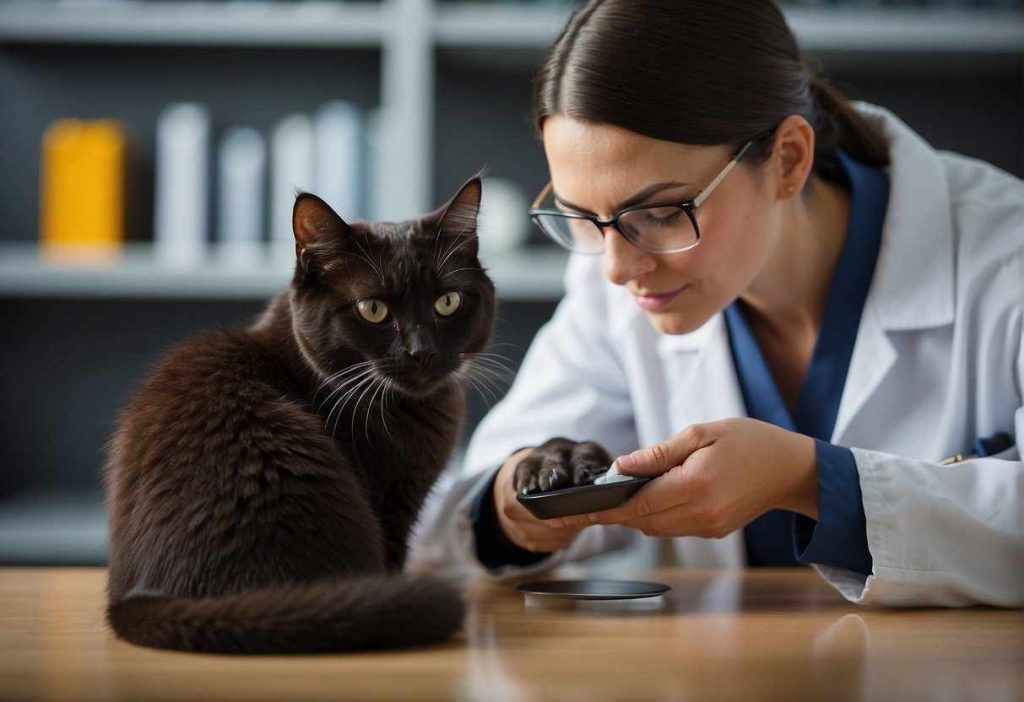
Let’s get some vet-approved insights on why this might be happening.
Common Causes of Black Tongue in Cats:
- Yeast Infections: This culprit can turn a cat’s tongue black. Other symptoms may include:
- Excessive thirst and urination
- Foul breath
- Skin lesions with a greasy coat
- Inflammation around genital or anal areas
- Burns: Has your curious kitty been chewing on cords or exploring around open lights? Mouth burns can result in a discolored tongue.
- Tongue Cancer: A more serious condition where signs include:
- Unexplained drooling
- The presence of a growth under the tongue
- Reluctance to eat
- Possible bleeding from the mouth
What to Do? First things first, if you notice a black tongue or any of these symptoms, it’s time for a vet visit. They can give an accurate diagnosis and treatment options.
Here’s a quick quiz to help you assess the situation:
- Is your cat’s tongue black or showing other colors?
- Have you noticed any unusual odors coming from your cat’s mouth?
- Is your pet drinking or peeing more than usual?
Any “yes” could mean a vet trip is in order!
We’ve chatted with Dr. Whiskers (not their real name, but wouldn’t that be perfect?), a renowned feline specialist, who emphasizes:
“Early detection is vital. Bringing your cat in at the first sign of abnormality can significantly improve outcomes.”
Syntax Tip: Make a checklist of symptoms and behaviors to mention during your vet visit. It helps your vet get a clear picture!
Remember, a black tongue can be a sign of various conditions, some more serious than others. Your vet can help unravel the mystery, and you’ll be doing the best for your furry companion.
Ready to be your cat’s superhero? Get that appointment scheduled!
Quick Recap
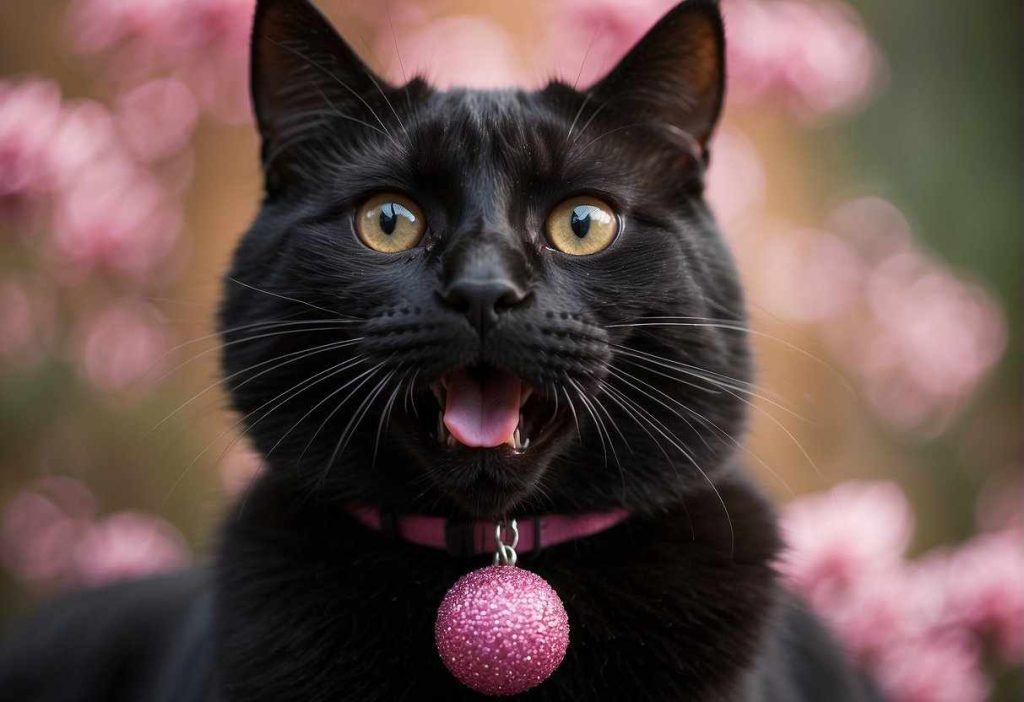
Have you noticed your feline friend’s tongue taking on a darker shade? Let’s brush on what might be causing the change:
- Fungal Infections: Your cat’s tongue may turn black because of a fungal infection. Catnip tea can be a little hero here, wielding its antifungal properties to fight off the infection while easing any pain from inflamed tissue.
- Yeast Infections: A yeast infection could be the unwelcome guest causing the color change. It’s an odd occurrence, but just like us, cats can get them too!
- Immune System Issues: Sometimes, the root of the problem lies in the immune system if there’s an infection at play.
- Dental Hygiene: Poor dental hygiene or low iron levels might also be culprits, turning your kitty’s lick machine a shade darker than usual.
- Liver Problems: It’s worth considering liver health as a possible factor for a black tongue. A vet visit is a smart move to rule this out.
- Hyperpigmentation (Lentigo): Notice black spots? This could be lentigo. More commonly seen in orange cat breeds, it’s basically a fancy term for extra melanin. No harm, just a bit more color.
Are you keeping a close watch on what goes into their bowl and making sure their water is as pure as can be? Switching to wet food and maintaining clean water bowls can make a real difference.
Statistics and studies are still out there, making sense of all this, but your keen eye and proactive care can lead to early detection and treatment!
Remember, if you ever suspect something’s not quite right, your vet’s expertise is just an appointment away. Your four-legged pal might hate the carrier, but they’ll thank you for the TLC with happier, healthier purrs.
Frequently Asked Questions
If you’ve just noticed that your cat’s tongue has a black hue, you’re likely brimming with questions.
Here’s a quick dive into the FAQs surrounding this peculiar cat tongue trait, so you can be in the know and ready to act if need be.
What immediate steps should I take if I notice my cat’s tongue is black?
Don’t panic! Check your cat’s mouth for any other signs of abnormalities such as odor, swelling, or excess drooling.
Reach out to your vet as soon as possible for professional advice—early detection might be crucial.
Can a black tongue in cats be a sign of poor nutrition?
Indeed, nutritional deficiencies might contribute to changes in the appearance of your cat’s tongue.
A well-rounded diet is vital for your cat’s overall health, so evaluate what your furry friend has been eating.
How can I differentiate between a harmless black tongue and a serious health issue?
Typically, a harmless discoloration might come and go or occur in a symmetrical pattern.
However, if it’s coupled with lethargy, appetite changes, or other symptoms, it could be serious. Best get a vet to take a look.
Could a black tongue be an indicator of cancer in cats?
While not always the case, persistent dark pigmentation on the tongue could be a sign of melanoma.
Early and regular vet check-ups are key to prevention and early treatment.
How long does it typically take for a black tongue to heal?
The healing time largely depends on the underlying cause. For benign causes, improving dental hygiene might resolve it quickly.
If it’s a more serious condition, your vet will be the best to estimate recovery time.
Are there any side effects of treatments for black tongue in cats?
Side effects can vary based on the treatment’s nature. Antibiotics, for instance, may alter gut flora, while more intensive treatments could have more significant effects.
Always discuss potential side effects with your vet.
What are the latest research findings about black tongues in cats?
Recent studies continue examining the various causes of a black tongue, but there’s no one-size-fits-all conclusion yet.
Your vet may be aware of the latest research and how it might pertain to your cat’s specific condition.
- Where to find the most trustworthy real money casinos - August 7, 2025
- Online Casinos That Approve PayPal: The Ultimate Overview - August 7, 2025

